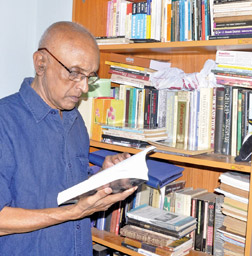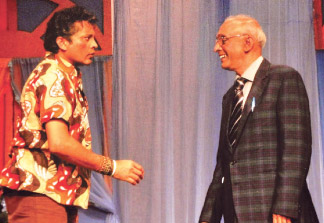|

Thespian with Shakespearean touch
Channa Bandara WIJEKOON
Bandula Vithanage came out with a great
guest performance in the cinematic masterpiece Guru Gedera. Sauntering
thoughtfully within an auditorium packed with distinguished guests, he
seemed engrossed in the mesmerizing voice of singers, who sang a nurthi
song to entertain the crowd. This performance of a few minutes duration
was sheer proof of Bandula’s versatility in acting.
Bandula Vithanage could be called the local Shakespeare for his
esteemed contribution over many decades to the motherland as a
playwright, actor and a producer of Shakespearean drama. He sent
pleasant vibes in the minds of local audiences by bringing the
Shakespearean masterpiece ‘Merchant of Venice’ to local stage.
 |
|
Bandula
Vithanage Picture by Sudath Nishantha |
A calm and collected, yet wise visionary, Bandula Vithanage is
Artscope’s ‘Encounter of the Week’.
Q: How did you develop an obsession for theatre and acting?
A: The inspiration came from the association with our English
teacher Bertie Abeysuriya at Ambalangoda Dharmashoka College. He used to
teach us fairytales.
The way he brought life to the characters motivated me to write the
drama ‘Cocks and Box’ and perform it with my friends when I was
schooling. I loved to read Sinhala folk tales and English literature
alike. The characters in these stories made pleasant stimuli in my mind
to bring them into real life.
Also the humour imbedded in these characters enthralled me. Thus I
read more and more and got the privilege to read Shakespeare too.
I did my secondary education in Sinhala medium. While in Colombo
University, I got the opportunity to associate with Prof Sarachchandra.
This opened doors for me to perform as Vidushaka in the P Welikala’s
cultural play Rathnaawali. The way I brought humour to this character
was commended by scholars.
While in University, I produced Megha Garjana (1969) the Sinhala
version of Harold Pinter’s short play ‘The Collection.’ Piyasena
Ahangama, Nirmani Kiriella and Vickrama Bogoda were casted. This was
followed by my production of Gangaawak… Sapaththu Kabalak saha
Maranayak, a script by Simon Navagaththegama.
We invited Sugathapala Silva to stage his play Thattu Gewal at the
University and made a relationship with him. This paved way for me to
become a member of the then famous Apey Kattiya headed by Sugathapala
Silva.
We used to watch his dramas rehearsed at Royal College and Thurstan
College. Eventually I was casted in his dramas Dunna Dunu Gamuwe,
Daawaddo and Thuranga Sanniya.
Q: Then you ventured into mega productions. How did you bring
your talents to the macro level and how was the initial response?
 |
|
A scene from Bandula Vithanage's
direction ‘Romaya Gini Gani’ (comedy) shown in Brisbane,
Austrailia in 2009. Picture shows Jaka Kumbukage and Bandula
Vithanage in a scene. |
A: We were encouraged by Sugath to read and study the works of
contemporary dramatists like Harold Pinter. Then in 1974 I produced Jean
Anouilh’s ‘Becket’ which had a cast of 53 artistes. Dharmasiri
Bandaranaike and Lucian Bulathsinhala did the main roles. Becket was not
recognized in the State Drama Festival though it was a milestone in the
translation drama history in Sri Lanka.
Acceptance by the audience was the significance of the drama and also
our motivation.Few years after, I got the opportunity to watch Becket
while in England. I did not see much difference between it and my
production.
Q: You pioneered in translating and producing Shakespearean
drama on the Sinhala stage. It may not have been an easy task. For
instance, the way great actors like Sir Laurence Olivier and Al Pacino
performed in Shakespeare dramas are benchmarks for other actors in the
world. How did you muster courage to translate and stage Shakespeare?
A: Shakespeare was in my whole system from childhood (laughs).
I have read a story like ‘Merchant of Venice’ over and over in regular
intervals and every time it inculcated in my mind unsullied notions
about the characters and their temperaments.
Shakespeare was the greatest playwright in history. He used the drama
as a mirror to examine his own city and society with particular
attention to the double standards of the rising merchant class. He could
forecast and see the logic of everyone’s actions. In the story of
Merchant of Venice, he at times takes Shylock’s side to justify his
actions.
The core story is very much similar to a fairytale. I loved
fairytales from my childhood. Antonio, Bassanio, Portia and Shylock
stimulate the feelings of emotion, humour, hatred and compassion in
reader’s (or viewer’s) mind.
I did a role of a university student in the film Pembara Madhu. In
the sets of the film in my leisure, I was reading ‘Merchant of Venice’
and Tony Ranasinghe who starred in the film saw it. He said, “Buddy why
don’t you translate and produce this for the local stage? If you do it,
cast me in the role of Shylock.” His words aroused the Shakespearean
creature in me.
I tried my level best to maintain the poetic rhythm in dialogues of
the original story in my translation. Maintaining the impact made by the
original story was my challenge. Bridging the gap of cultural barriers
was another challenge. However, I did the translation within one year.
Tony made a comeback to the stage after a lapse of twelve years in
1980. He performed the character of the crafty Jewish moneylender
Shylock emerging from ghettos of Venice. Avanthi Aponsu was Portia.
Later on, Kinsley Louse played the character of Shylock differently, yet
maintaining credibility of his performance.
Q: Can you recall your experiences with the play Merchant of
Venice?
A: The play was an instant success. That was mainly because
Tony’s performance as Shylock. He is one of a kind; a word perfect
actor. Before every show, he used to sit with me and memorize his
dialogues. The famous ‘Pound of flesh’ quote by Shylock went well with
the local audiences.
Henry Jasaysena was in the front seat at the premiere and soon after
the show we got a standing-ovation from the crowd. Usually all
Shakespeare dramas come to a climax and then conclude with an
anti-climax. So does Merchant of Venice. When we rehearsed the play at
Carey College, we took a collective decision to end the play when it
reached the climax - Shylock sentenced to death. We thought the local
audiences may not like to see an anti-climax ending.
However, Sugathapala Silva suggested that we do some test marketing
before going public and thus the full drama with the anti-climax was
shown to the hostellers of Carey College around 10 o’clock on a
particular day. To our surprise, the audience liked it that way. We
staged it that way and five years at a stretch we got bookings for the
drama. In certain months alone, we staged the drama for more than 25
times. I worked at SLBC at the time and we got the fullest blessings of
our superiors. They even went to the extreme of giving free publicity.
When TV was introduced to our country, we were invited to do the
drama in a studio and it was televised with three cameras to be shown on
TV. Becket too followed suit. Thus masses saw them on TV.
Q: You had got the rare opportunity to see dramas while your
stay in England. You would have grasped finer points in drama acting and
producing by watching these dramas, especially Shakespeare. Your
comment.
A: I lived in England for three and a half years after the
expulsion of me and Lucian Bulathsinhala from SLRC. I was without a job
and my brother took me to England. I spent time watching dramas. A
ticket for a matinee show could be obtained for five pounds. Shakespeare
dramas were shown in Barbican Theatre in London. I have seen four
versions of Hamlet there.
I have seen on tape, Sir Laurence Olivier performing Shylock. He had
a free way of expressing. When the final verdict is given to Shylock,
Sir Olivier as Shylock plays havoc by generating a roaring sound from
his throat which gives shivers to the audience.
More recently, Al Pacino did the same character and he underplayed
it. Yet, they both added credibility to their performances and the
audiences liked them both. Even our own Tony Ranasinghe too played
Shylock differently time to time. When I enquired he told me, “Doing the
same character over and over again the same way make me bored. I think
my audiences do feel the same way, thus I bring variation to delivery of
dialogues and gestures in a subtle manner time to time.”
Tony adapted Sir Laurence Olivier’s way of free acting style to do
Shylock’s role. We all thought at that time, it is the best way to
project Shylock.
Q: This is in contrast to method acting, a different school of
thought which had evolved alongside.
A: Stanislavsky said acting cannot be taught. When casting is
done and each actor knows what his or her character is, automatically
chemistry is developed between them. When they start delivering
dialogues, the cast automatically convert themselves to the alter-egos
of hero, Villain, girl and so forth and so on. Thus in method acting it
is told, only the director knowing the script is enough and the actors
should know their dialogues.
The American method acting which evolved from Stanislavsky’s school
of thought is being practiced by many versatile actors now. The actor
adds credibility to the character by first conceiving the concept of the
character and then delivering it.
Many actors such as James Dean, Dustin Hoffman and even Marylyn
Monroe have studied American method in Lee Strasberg’s ‘Acting Studio’
in New York. Strasberg is called the father of method acting in America.
Once Joe Abeywickrama told me, he originated the emotion to cry in a
film scene by visualizing in his mind the day of his dog’s death. This
is something taught in method acting schools.
Q: In your opinion, what do you think Shakespeare’s best drama
is?
A: For ages ‘Hamlet’ had been considered the best one. However
in the present context, ‘Macbeth’ the shortest tragedy of Shakespeare is
considered the best one. It is more poetic too. In ‘Macbeth’, the main
character is an anti-hero. He kills everyone who had the legacy to
become the king, like in ‘Richard the Third’. However, Macbeth justifies
his actions in the eyes of the viewer (or reader). The strongest
becoming the ultimate survivor had been the norm in olden days. Macbeth
did not have a birthright for the throne. Thus he vanquished all
contenders stood in his way, to become the King.
[email protected]
|



